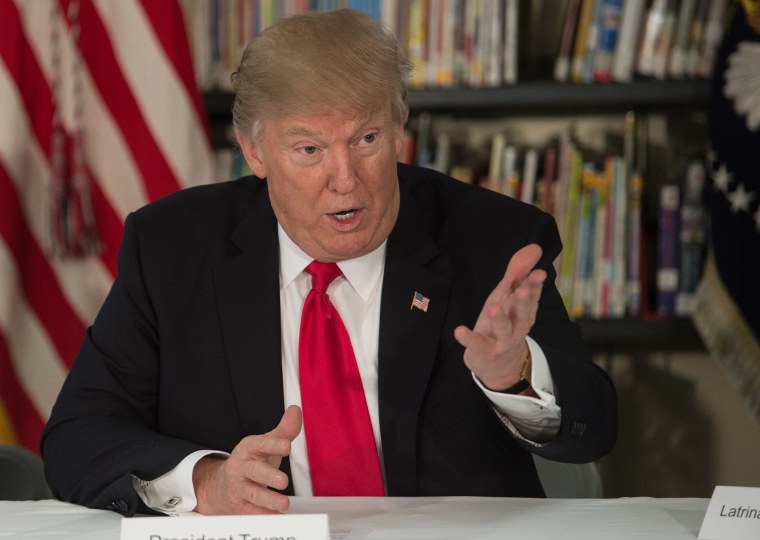President Trump's surrogates have defended his unsubstantiated claim that the Obama administration tapped his phones by saying he knows things that others don't.
Which is true — at least when it comes to top-level sensitive information gathered by U.S. intelligence agencies.
"He is at a much higher classification than I am so he may have classification to documents that I don’t know about," Deputy White House Press Secretary Sarah Huckabee Sanders said on the TODAY Show Monday.
"He’s the President of the United States," White House counselor Kellyanne Conway said moments later on Fox News. "He has information and intelligence that the rest of us do not, and that’s the way it should be for presidents
While there is still no indication that he based his explosive tweets about the previous administration on anything other than conspiracy theories on the internet, Trump, as commander-in-chief, does have the power to declassify information about national security matters at his whim, legal experts say.
Related: Does Obama Have Grounds to Sue Trump for Libel?
But presidents typically use that authority in a measured way, including an analysis by lawyers or agency heads of whether releasing the information serves the public interest.
Trump may have done it in an early-morning tweetstorm, if you believe his surrogates.
"This seems more ad hoc and personalized than the normal way in which presidents can push to get things out to the public when they think it would be appropriate to do so," said David Pozen, who teaches national security law at Columbia Law School. "But it's also so vague what we're talking about that it's not clear there's any order from a FISA [Foreign Intelligence Surveillance Act] court that conforms to what President Trump is describing."
Related: Obama Spokesman Disputes Trump’s Wiretapping Claim
Indeed, the White House has offered no proof of Trump's claim that former President Barack Obama had the phones at Trump Tower wiretapped during the 2016 campaign. The Justice Department and FBI haven't commented, although a senior U.S. official confirmed to NBC News that FBI Director James Comey asked the agency to publicly knock down Trump’s claim.
An Obama spokesman dismissed Trump's claim as false. A senior U.S. official also told NBC News that the claim was baseless.
And former Director of National Intelligence James Clapper, who was in office up until Jan. 20, flat-out denied any wiretap of Trump Tower took place.
The president's power to declassify national security information stems from the powers granted him by the Constitution, and outlined in executive orders that, in recent decades, each commander-in-chief has tweaked. Trump has yet to add his mark, so he is working under Obama's order on classified information, issued in 2009.
Trump's assertion appears to stem from conservative media outlets, such as Breitbart, and anonymously sourced reports on British blogs. According to those reports, U.S. officials obtained a warrant under the FISA to investigate contacts between computers at a Russian bank and a server inside Trump's campaign headquarters at Trump Tower.
The president made the allegation as his administration has come under increasing scrutiny for associates' communications with Russian officials before and after the election. Trump and his aides have denied any improper contacts.
Trump has asked for Congress to investigate, and the same committee looking into the Russian ties will add the wiretapping claim.
Rep. Peter King, R-New York, a member of the House Intelligence Committee, said he wished Trump hadn't made the claim with a tweet "because this is such a serious issue."
The committee's chairman, Rep. Devin Nunes, R-California, told a hometown ABC affiliate that there was no proof of the wiretapping "at this point," and said Trump would have "had more of an impact" if he "worded it a little bit differently." But Nunes argued that the allegation was not unlike the Russia allegations reported in the press.
Patrick Eddington, a policy analyst in civil liberties and national security issues at the libertarian Cato Institute, said with volatile but unproven allegations coming from both sides, the solution is to declassify more information to clear up what has become a potential crisis.
“If it’s really that serious, and you’ve got the goods, put your cards on the table,” Eddington said.

